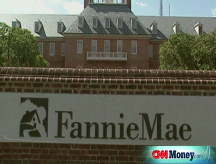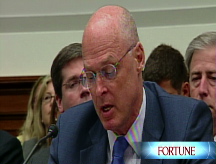Treasury near plan for Fannie and Freddie - report
Wall Street Journal reports that Treasury could announce a backstop for troubled mortgage buyers and senior management changes as soon as this weekend.
 |
| Shares of the two troubled mortgage giants have plummeted more than 80% this year on fears about their financial health in the wake of the housing crisis. |
NEW YORK (CNNMoney.com) -- The Treasury Department is close to finalizing plans to effectively take over beleaguered mortgage buyers Fannie Mae and Freddie Mac, according to a report published Friday.
Citing sources close to the matter, The Wall Street Journal reported that an announcement could come as early as this weekend. Shares of both companies plunged in after-hours trading.
The government may put the companies in conservatorship and take control of them at least in the short-term, the Journal reported. The plan also may include a capital injection in the government-sponsored entities by the Treasury and changes to senior management at both firms, according to the report.
In a statement, the Treasury Department said it would not "comment on rumors." Representatives for both Fannie Mae and Freddie Mac declined to comment on the report.
The two firms, which were set up by the government, own or back about $5 trillion worth of home debt - half the mortgage debt in the country. Since last summer, they have suffered about $12 billion in losses.
Concerns over whether Fannie (FNM, Fortune 500) and Freddie (FRE, Fortune 500) will have enough money to weather future losses in the housing market sent shares sharply spiraling lower earlier this summer.
By mid-July, the Treasury Department and Federal Reserve announced steps in mid-July to make funds available to the firms if necessary and Congress approved the sweeping proposals later that month.
The Treasury Department retained Wall Street's Morgan Stanley in early August to advise it on its new authority to prop up the two firms. Morgan will provide advice on capital markets, capital structure, strategy and mortgage-related matters through January 17. It will not be paid for the work, beyond accepting $95,000 for expenses. Morgan Stanley had no comment about the report.
Fannie and Freddie have become virtually the only source of funding for banks and other home lenders looking to make home loans. Their ability to do so is crucial to the recovery of the battered home market and the broader U.S. economy.
The two firms buy loans, attach a guarantee, then sell securities backed by the loans' income stream. They have been badly hurt in the last year by the sharp decline in home prices and the rise in mortgage delinquencies and foreclosures.
Both companies have been losing money for the past few quarters due to the subprime mortgage meltdown and steep declines in housing prices.
Bert Ely, an independent banking analyst, told CNN that Freddie Mac CEO Richard Syron could be forced to step down as part of Treasury's plan. Fannie, meanwhile, recently announced that its chief financial officer and chief risk officer were leaving the company.
Ely added that it is a surprise that Treasury may be acting now though because there has not been a lot of pressure on the companies from Wall Street in the past few days. Freddie's stock rose 13% during the holiday-shortened week while Fannie's stock gained 3%.
Shares of both companies are still down more than 80% so far this year, however.
The ultimate cost to the taxpayer of any Treasury intervention remains unknown.
In any rescue, Treasury would likely have to borrow billions of dollars. Exactly how much it would cost taxpayers is impossible to gauge because of several unknowns. Among them: extreme volatility in the companies' stock prices coupled with falling home values and rising mortgage default rates, which affect the value of the GSEs' assets and debt.
Long-term, the potential downside of a Fannie-Freddie intervention could increase taxpayer costs in other ways. One of them: It could in a slow-growth environment help drag down the government's top-notch credit rating. And that could make it more expensive for the government to borrow, putting pressure on future administrations to raise taxes or cut spending.
CNNMoney.com's David Ellis, Tami Luhby and Jeanne Sahadi and CNN's Gerri Willis and Allan Chernoff contributed to this report. ![]()




